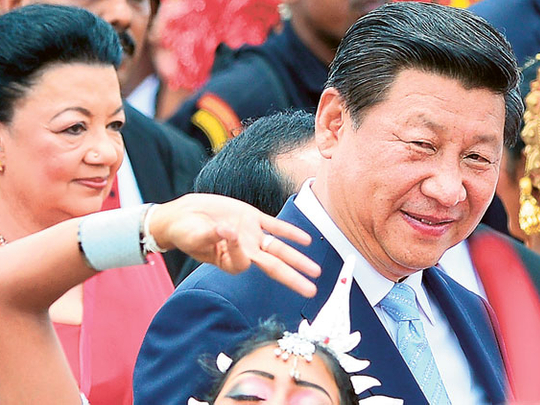
Colombo: Chinese President Xi Jinping arrived in Sri Lanka on Tuesday to launch construction of a Beijing-funded $1.4 billion (Dh5.14 billion) port city and seek closer defence ties that could provoke unease in neighbouring India.
China is increasingly asserting its influence in the Indian Ocean, with Sri Lanka a midway point on one of the world’s busiest international shipping lanes.
It is already the largest investor in Sri Lanka, having financed the construction of a deep-sea port elsewhere and an international airport.
Xi will on Wednesday kick off construction of the new port city, to include the country’s first Formula One track.
In a letter published on the front page of Sri Lanka’s state-run Daily News on Tuesday, Xi said he wants to “enhance exchanges and cooperation between us in maritime, business, infrastructure, defence, tourism and other areas”.
The reference to defence came despite the repeated insistence of Sri Lankan officials that relations were based on commercial rather than security considerations, an apparent attempt to allay Indian fears.
Sri Lanka’s economic development minister Basil Rajapakse said ahead of the visit his country’s close ties with China should not be a cause for concern in India.
“We are looking for trade, investment and tourism,” Rajapakse said.
“India is also looking to China so I do not see anything wrong in our having close ties with them.”
Some officials in New Delhi have voiced fears in the past that China’s growing engagement in the region is a deliberate strategy to encircle India.
A military aircraft maintenance facility which Sri Lanka sought to establish with Chinese help has been in limbo since India privately objected to its chosen venue, the eastern port district of Trincomalee.
Trincomalee is a natural deep-sea harbour which allied forces used as a staging post during Second World war. It is still considered strategically important.
Xi also said no country should be allowed to intervene in the affairs of the small island nation, which has historically come under India’s influence.
“China... resolutely opposes any move by any country to interfere in Sri Lanka’s internal affairs under any excuse,” Xi said
Beijing has consistently supported Colombo in its efforts to resist a UN investigation into alleged war crimes against Tamil Tiger rebels, while India has pushed Sri Lanka to ensure accountability.
Xi was greeted by President Mahinda Rajapakse as he arrived in Colombo in a ceremony involving dozens of schoolchildren and elephants.
He will hold talks with Rajapakse during the two-day visit, and is expected to finalise more than 20 agreements on trade and aid.
Beijing has already financed the construction of Sri Lanka’s second international airport and a deep sea port in the southern district of Hambantota, the home constituency of President Rajapakse.
The ambitious port city project being developed by the Sri Lanka Ports Authority with Chinese backing will include a luxury marina and a Formula One race track.
Authority chief Priyath Bandu Wickrama said the port would be “based on commercial interests”.
“We will not allow our ports for any military purposes,” he said. “There is nothing for anyone to fear.”
The Chinese president arrived from the neighbouring Maldives, where he secured support for his “21st century maritime silk road” — an initiative that seeks to secure trade routes, largely through economic diplomacy, and already has Colombo’s backing.
During his visit Xi will commission the third phase of a 900-megawatt coal power plant China has built on the island’s northwestern coast.
China also faces competition for influence in the region from Japan, which relies on the same maritime trade routes.
Japanese Prime Minister Shinzo Abe travelled to Sri Lanka earlier this month, securing an agreement that the two countries would forge stronger maritime links.
India’s new Prime Minister Narendra Modi, meanwhile, has embarked on a regional charm offensive since taking office in May to restore relationships which critics say the previous government neglected.












